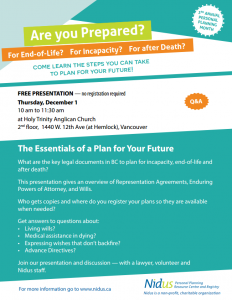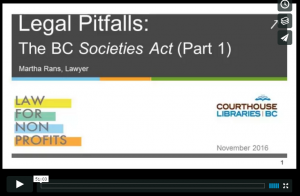Dec. 2016 – Events (Vancouver, Victoria, Burnaby)
Bookmark this post! It will be updated as more events are announced. You can also get frequent updates via our Twitter. Have a suggestion? Email us.
- Thursday, December 1 (10:00-11:30am): Nidus is hosting an event at Holy Trinity Anglican Church, 1440 W. 12th Ave (at Hemlock), 2nd floor, Vancouver, to wrap up Personal Planning Month. The Essentials of a Basic Plan for Your Future: What are the key legal documents in BC to plan for incapacity, end-of- life and after death? Who gets copies and where do you register your plans so they are available when needed?
- This presentation will provide an overview of Representation Agreements, Enduring Powers of Attorney, and Wills. Find out where to get the legal forms and how to register them after they are completed. There will be time for Q & A. Registration is not required.
- Saturday, December 3 (4:00-6:00pm): BCCLA is promoting the Public Town Hall for Consultation on National Security at the SFU Vancouver Morris J. Wosk Conference Centre, 580 West Hastings Street, Vancouver. Participants are
 encouraged to register in advance via ps.nsconsultationvancouver-consultationsnvancouver.sp@canada.ca.
encouraged to register in advance via ps.nsconsultationvancouver-consultationsnvancouver.sp@canada.ca.
- BCCLA writes: We have an unprecedented opportunity for Canadians to weigh in on the recent radical changes to our national security landscape (eg. “C-51”) and our long-standing deficits in national security transparency and accountability. Now is the time to make our voices heard.
- Monday, December 5 (12:00-1:30pm): Executive Directors Series: Auditing – Lunch and Learn, at the Volunteer Victoria Learning Centre, 306-620 View Street, Victoria. Have you ever wondered about the differences between an audit and financial reporting to funders?
- The new Societies Act requires all “reporting societies” to appoint an auditor – but what is the role of an auditor; in what ways can an auditor help; and what do you need to know about choosing an auditor. Join Richard Games as he explores the benefits to stakeholders of an audit and answers your questions regarding financial statement audits in this free lunch and learn. Get Tickets here.
- Monday, December 12 (7:00-8:30pm): People’s Law School and Burnaby Public Library are partnering to put on a session about Common-Law Relationships: Learn about
 your rights and responsibilities before moving in together. After living with someone you can be considered a spouse or common-law partner after a certain amount of time.
your rights and responsibilities before moving in together. After living with someone you can be considered a spouse or common-law partner after a certain amount of time.
- Join family law lawyer Kevin Quong as he explains laws regarding common-law relationships and how to protect yourself and other family members. This free information session is presented in partnership with People’s Law School. Registration is required and space is limited. Please register online or phone the Bob Prittie Metrotown Branch at 604-436-5400.
 The new
The new 
